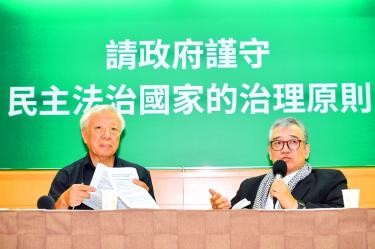The government has created a legal loophole in the Forward-looking Infrastructure Development Program by rushing it through, allowing it to raise the program’s budget indefinitely, publisher and former national policy adviser Rex How (郝明義) said yesterday, calling for an amendment and an overhaul of the program.
There is no sunset clause in the Special Act on the Forward-looking Infrastructure Development Program (前瞻基礎建設特別條例), nor is there any clause specifying a budget cap, How said.
The act does not specify an end date and while it stipulates a four-year maximum budget of NT$420 billion (US$13.73 billion), which can be extended following legislative approval, there is no clear limitation on the timing and budget extension, How said.
The draft proposal stipulated a maximum NT$882.4 billion budget over eight years, but the budget cap and the sunset provision are not included in the final version that has been passed into law, he said.
“The act will have a permanent effect before the Legislative Yuan abolishes it, and the [budget extension] clause will allow the ruling party — regardless of which party it is — to raise a budget of NT$420 billion every four years,” How said, citing National Taiwan University politics professor Liu Ching-yi’s (劉靜怡) criticism of the act.
Following the passage of the act on Wednesday last week, Liu and civic groups raised doubts over the apparent flaw in the legislation, but the Cabinet rejected their accusations as “false” and “unfounded,” with Executive Yuan spokesman Hsu Kuo-yung (徐國勇) accusing Liu of “rumormongering” and asking the public “not to be too picky about the wording” of the legislation.
“The government has either discredited its critics or explained away the criticism made against it,” How said.
The Executive Yuan should have requested a reconsideration of the act given the apparent flaw, but President Tsai Ing-wen (蔡英文) promulgated the act on Friday, How said.
“The top priority of running a democratic nation is procedural [justice]. It violates the principles of a democratic nation if government leaders only care about the effectiveness [of a policy] at the expense of procedural [justice],” How said.
“If the government continues to act without checks and balances, it will become an autocracy,” he said.
How asked the Legislative Yuan to amend the law to include a sunset clause and a budget cap, and asked the Executive Yuan to propose a new infrastructure program that takes public opinion into consideration.
How’s suggestions have been endorsed by former Democratic Progressive Party (DPP) legislator Lin Choi-shui (林濁水) and Academia Sinica sociologist Chiu Hei-yuan (瞿海源).
Chiu said he had relayed How’s suggestions to Tsai during the National Congress on Judicial Reform on Monday, adding that she reacted positively to the suggestions.
While asking the DPP to propose an amendment to include a sunset provision and a budget cap, Chiu also urged the Chinese Nationalist Party (KMT) not to boycott a review of the proposed budgets, but to ensure a thorough review.
At a separate news conference, New Power Party Executive Chairman Huang Kuo-chang (黃國昌) also lambasted the Executive Yuan for rushing the infrastructure program budget review.
Presidential Office spokesman Sidney Lin (林鶴明) said the government has taken note of the suggestions voiced by How and others, and the Cabinet had already responded by providing correct and complete information.




